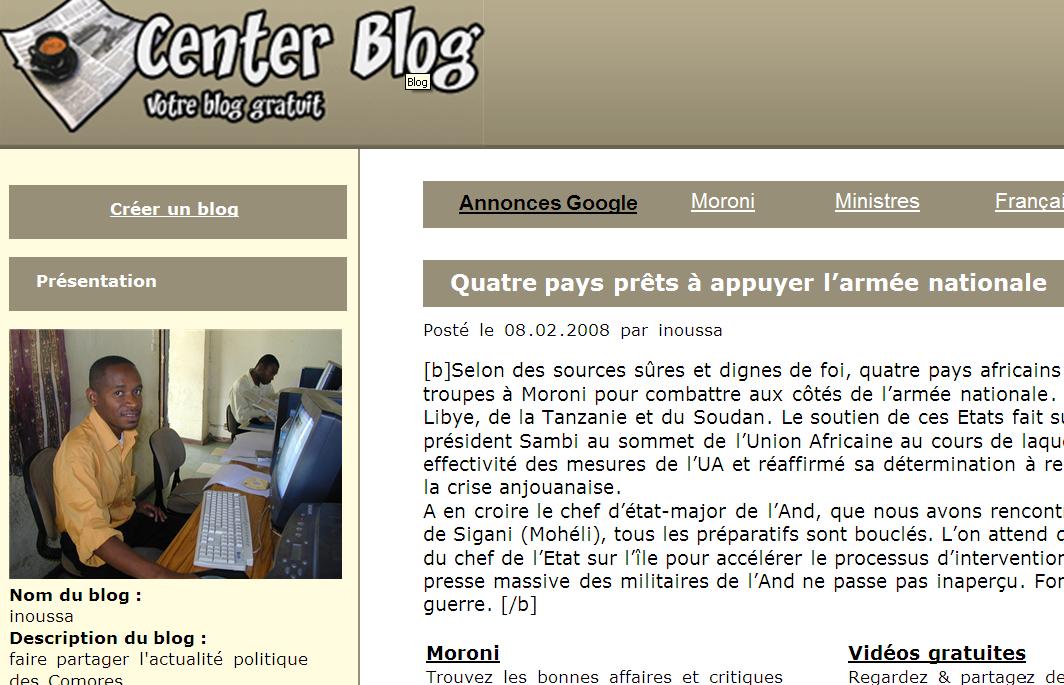Cyberspace is the new frontier in the simmering Comoros conflict, with a surge in blogs by Comorians venting their opinions on the dispute between the semi-autonomous island of Anjouan and its renegade leader, and a Union government determined to bring him to heel.
The cost and difficulty of accessing the internet had kept online traffic low in the Comoros, with chatter mainly among Comorians living in France, the former colonial power. However, the threatened invasion of Anjouan by the Union government of Ahmed Abdallah Sambi has got the keyboards working.
Inoussa Mohammed, news editor of a weekly government newspaper, Al Watwan, started blogging on political affairs on the Indian Ocean archipelago in August 2007. "It's better visited by people outside [the islands] than those living here, but recently people have started to react to my columns," he told IRIN.
The response has been often venomous, usually rumour-filled, but underlines the long history of secessionism and strife that has dominated the post-independence history of the three small islands of Grand Comore, Anjouan and Moheli.
"I hope Sambi will use his authority towards this handful of delinquents who are keeping the population of Anjouan in fear and insecurity," thundered one blogger.
"Can we know when the invasion will come? We want to finish with the AND [Union military forces]. We want to finish with Sambi. If you are close to him, tell him that the FGA [Anjouan military forces] are impatient for the war to begin," replied another.
The political standoff began in June 2007 when Sambi and the African Union (AU) tried to postpone elections on Anjouan, citing irregularities and intimidation in the run-up to the polls. A defiant island president Mohamed Bacar printed his own ballots on Anjouan, held polls anyway and claimed a landslide victory of 90 percent.
Neither Mohamed Bacar nor the Union government, which is demanding a fresh election on Anjouan, is prepared to compromise. Efforts by the AU to negotiate a deal have failed to break the deadlock, as have sanctions targeting the freedoms and financial assets of Anjouan's leadership, hunkered down on their island, just 80km of Indian Ocean away from Grande Comore, the seat of the Union government.
Seperatism
"I do not think the departure of Mohamed Bacar and his confederates is an end in itself," Inoussa Mohammed wrote in a recent blog. "The separatist crisis is perceived by some Anjouanese as a legitimate response to the unacceptable domination of Ngazidja [Grande Comore] over the two other islands ... this small archipelago of less than one million people has paid dearly for its divisions."
Comoros has been plagued by political strife, enduring 19 successful or attempted coups since independence from France in 1975. The islands of Anjouan and Moheli, complaining of neglect by successive governments in Grande Comore, declared unilateral independence in 1997.
Protracted negotiations, brokered by the then Organisation of African Unity (now the AU) succeeded in securing a political agreement based on a power-sharing federal system, known as the Fomboni Declaration.
The agreement gave the individual islands their own semi-autonomous government and president, with a rotating Union presidency. The federal government controls security and financial matters, while the island authorities control local policies, in cooperation with an over-arching federal administration.
The system was designed to tackle the perception of Grande Comore's political dominance, but despite Sambi hailing from Anjouan, the perception has stuck: "This [separatism] is definitely about competences [the Union government's powers] and power-sharing problems, which were not well negotiated in Fomboni," wrote one blogger with the pen name of Habari.
It is a view also increasingly shared by the international community. A diplomat in Moroni, the national capital, situated on Grand Comore, told IRIN, "If the government regains control, they need to organise elections and then, when a legitimate [Anjouan] government is in place, authorities need to sit down together and have dialogue.
"They need to look at the current constitution and amend it. It is clear that it is not working - it leads to too much dispute - and having four governments [a union government and one for each individual island] is far too expensive."
hm/tdm/oa/he
This article was produced by IRIN News while it was part of the United Nations Office for the Coordination of Humanitarian Affairs. Please send queries on copyright or liability to the UN. For more information: https://shop.un.org/rights-permissions





